Will Pot Legalization Fix Racial Disparity in Marijuana Arrests?
Tuesday, July 07, 2015

But David Rogers, director of ACLU Oregon, cautions against being too optimistic. “Change is going to be slow, and it’s going to require intentional work and diligence… Although I remain optimistic, my optimism isn’t taking the place of continued action in the issue. It’s something that we’re going to have to continue to examine.”
In 2010, of Oregon’s 9,849 arrests for marijuana possession, 420 of them were of blacks or about 4.3 percent. Since Oregon’s population is actually only about 2 percent black, blacks were twice as likely to get arrested for marijuana possession than whites, according to the ACLU’s 2013 national report. The report uses data from the Federal Bureau of Investigation, which collects from local agencies.
“In our minds when you look at the racial disparity both nationally and in Oregon it raises a real concern and … an attempt to legalize and tax marijuana could be a step in the right direction,” said Rogers.
New legislation, approved last week, could have further impact in achieving racial justice, he added. House Bill 3400, signed into law on June 30, creates a pathway to expunge records of marijuana-related charges and also adjusts sentences for convictions. Previously, a marijuana possession arrest could lead to five years in prison or a $125,000 fine if convicted. Today, it is only classified as a misdemeanor and could cost a person up to one year in prison or a $6,250 fine.
Also, House Bill 2002, which passed through Legislature and is awaiting the governor’s signature, would prohibit law enforcement from profiling based on any number of factors, including race, ethnicity, color, national origin, language, age, gender, gender identity, sexual orientation, political affiliation, religion, homelessness or disability.
“It could have a broad impact, so we’re excited about it and we’re active in supporting the bill,” said Rogers.
The bill also revives a legislative committee on racial equality in law enforcement (the Law Enforcement Contacts Policy and Data Review Committee or LECC). PSU criminal justice professor Brian Renauer, the director of the committee, said, “We are quite excited to reboot the LECC and get it up and running.”
The committee, previously funded by the state and then a federal grant, ran out of funds in 2013. Now, it will add a new duty to its mission—providing a way for citizens to make complaints about profiling encounters with law enforcement. It will also continue some of its previous activities, which included data analysis and leading trainings with police officers.
The committee’s past work was primarily looking for bias in police traffic stops and did not provide enough detail to determine whether stops yielded marijuana arrests, so the data analyzed by the LECC isn’t comparable to the ACLU report, but it is related and informative.
In data from Portland Police Bureau traffic stops between 2004 and 2008, African American drivers comprise 14.6 percent of traffic stops and six percent of the driving population. Hispanic drivers comprised 9.4 percent of traffic stops and 7.6 percent of the driving population.
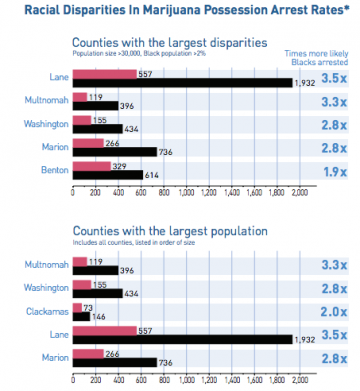
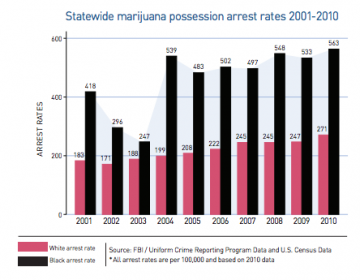
The LECC attempts to determine if racial bias exists and has also identified a number of other possible reasons for racial disparity in traffic stops, including high number of police patrol in neighborhoods of people of color and higher nighttime arrest rates (when officers may be patrolling those neighborhoods but unable to tell the race of a person) than daytime rates.
Of course, these reasons cannot be directly applied to analysis on marijuana arrests.
Another area that can be sticky is how comprehensive the data is that is collected. It is not mandatory for agencies to collect data on race or ethnicity, and collection is based entirely on the officer’s perception of an individual’s race. An officer cannot ask what race a person is. Due to these variances, it is a bit difficult to compare apples to apples.
The ACLU report also points out that ethnic categories, like Hispanic or Latino, could overwhelmingly be categorized under white. The FBI has no racial category for Hispanic or Latino, so even if local law enforcement agencies do track ethnicity, when the data is compiled nationally, it gets lumped together. So considering states that have higher Hispanic or Latino populations, like Oregon, which has 12.3 percent compared to 2 percent black, the actual number of arrests of whites who are not Hispanic or Latino could be lower than the data suggests.
Ultimately, the puzzle remains: Whites and Blacks smoke marijuana at the same rate, according to the ACLU report, so why are there more arrests of Blacks?
The ACLU maintains that “the war on marijuana has been carried out in staggering racial bias. It’s a national problem and it’s a statewide problem,” said Rogers.
It is worth noting, though that Oregon actually has the fourth lowest disparity of the 50 states plus Washington D.C., and recent legislation in Oregon indicates an openness to racial justice.
But Rogers said it’s important to stay watchful. “I hope that we actually do continue to try to be really intentional when thinking about racial disparity because we want to get this right,” he said. “We want to be a welcoming state. We don’t want this to be trending in the wrong direction,” said Rogers, who noted that Oregon’s demographics are changing as communities of color grow.
Additionally, while lifting the prohibition on marijuana could lead to lower disparity, that wasn’t the case in Colorado or Washington, which are also both states with lower rates of disparity than others. Colorado has lower rates of disparity than Oregon, while Washington ranks 12th lowest with blacks being 2.75 times likely to be arrested for marijuana possession than whites. The nationwide rate is 3.73 times more likely.
While lifting marijuana prohibition decreased the number of arrests related to marijuana, the gap between arrests of blacks and whites remained.
But if Rogers is right, “There isn’t going to be one silver bullet, but I think we’re going to be able to start using the tools that we have,” said Rogers. That includes new laws regulating marijuana and others like House Bill 2002 that can address racial justice in law enforcement.
Related Slideshow: Recreational Pot Officially Legal in OR: What State Advocates Have to Say
State and non-profit leaders of the drug reform movement gathered at the American Civil Liberties Union (ACLU) to speak about what legal weed means for Oregon, and why it matters.
Related Articles
- Oregon’s New Marijuana Law: Everything You Need to Know
- Oregon Liquor Control Commission Releases Marijuana Policy Recommendations
- Portland City Council Discusses Marijuana Tax
- Recreational Marijuana Regulation Policy Likely to Be Stricter Than Medical



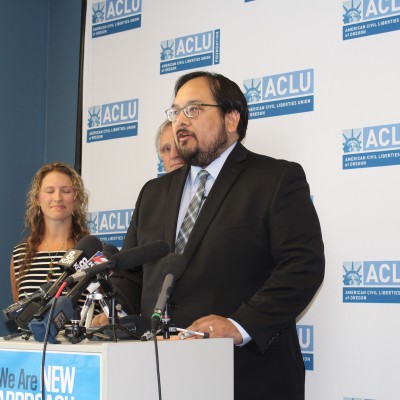
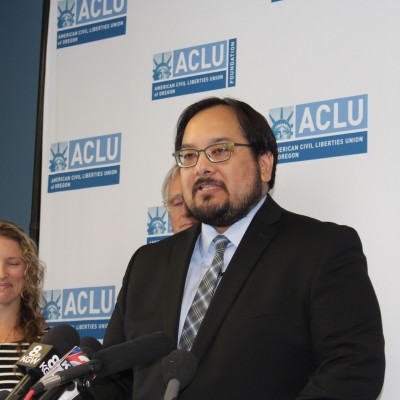

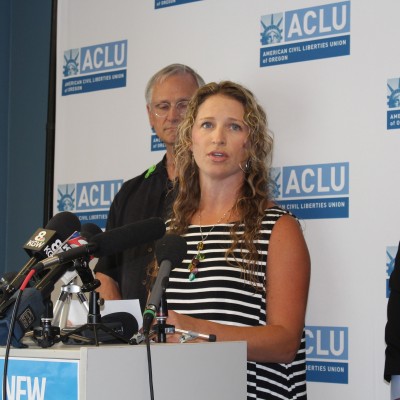
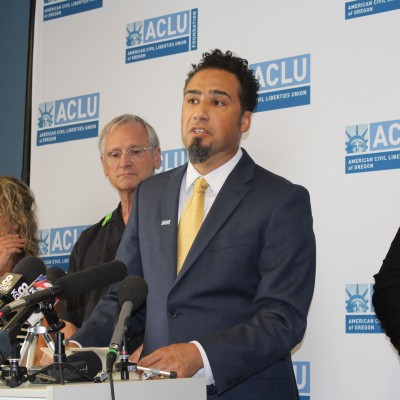
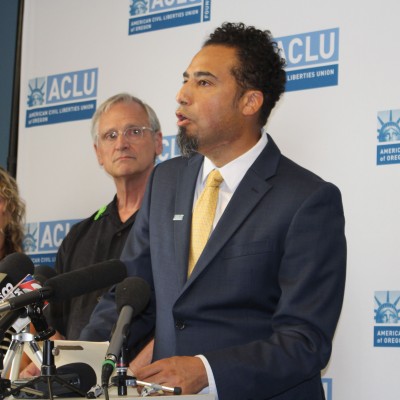











Follow us on Pinterest Google + Facebook Twitter See It Read It